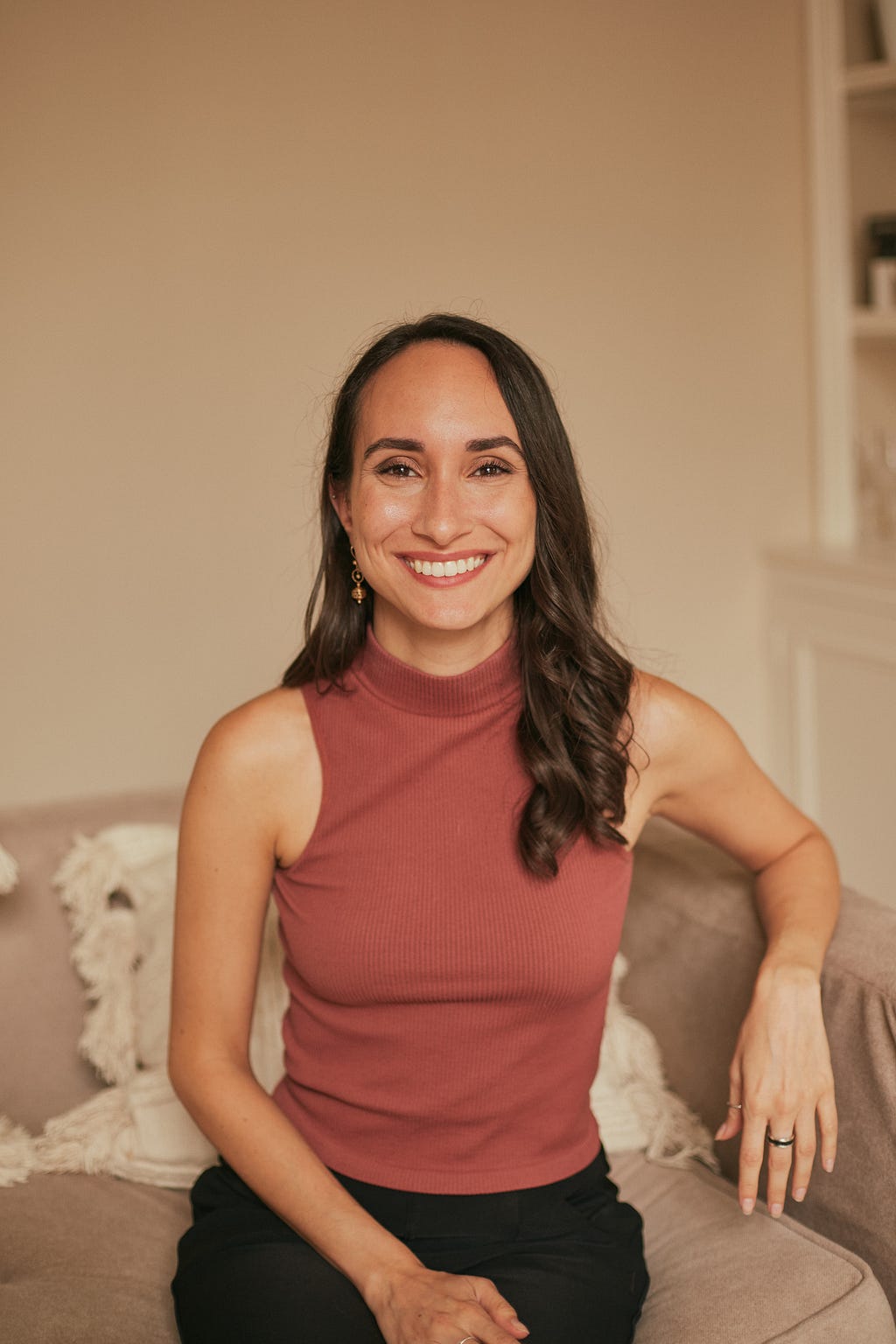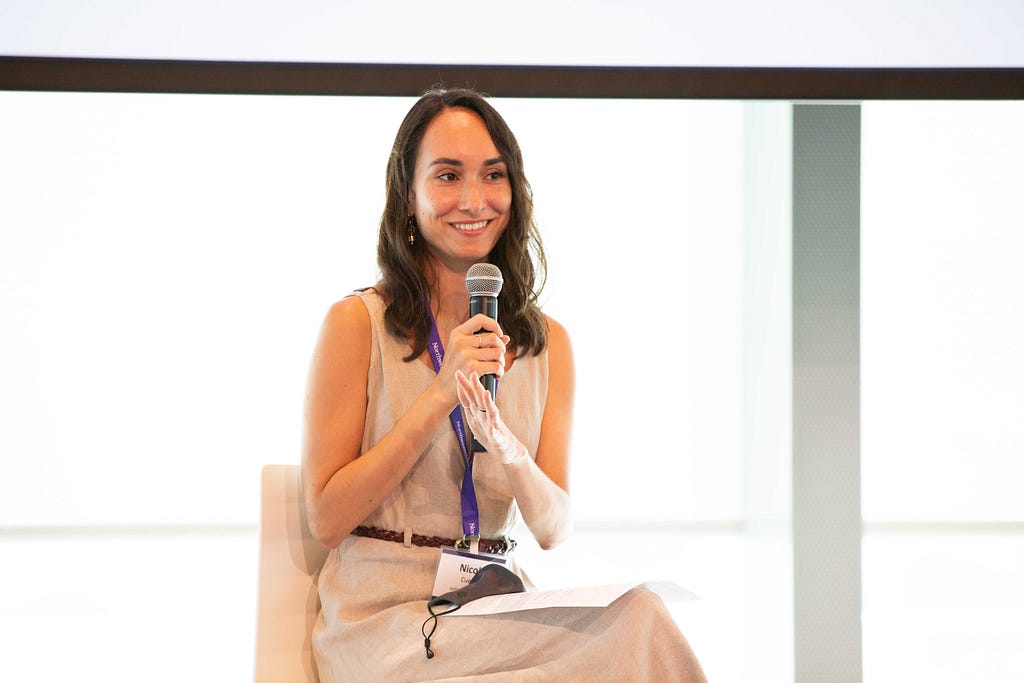
Set deadlines internally, not externally. Many unexpected events will happen that will derail timelines. It’s great to have them for yourself and the team, but be flexible when things come up, and don’t set outwardly optimistic deadlines or you will disappoint people.
As part of my series about “individuals and organizations making an important social impact”, I had the pleasure of interviewing Nicole Cuervo, Founder and CEO of Springrose.
Nicole Cuervo founded Springrose in 2020 in honor of her grandmother Rose, who had chronic pain and arthritis. Springrose designs adaptive intimate apparel that improves quality of life for women with limited mobility by helping women get dressed painlessly, regain their independence, and maintain their dignity. They serve over 50 different conditions and worked with 600+ women and clinicians to develop their flagship product, an adaptive bra that can be put on multiple ways.
Nicole is a graduate of Brown University, has a double masters MBA from Kellogg School of Management and MS from McCormick School of Engineering at Northwestern University and previously worked at Deloitte Consulting with government and non-profit clients.
Thank you so much for joining us in this interview series! Can you tell us a story about what brought you to this specific career path?
I’d always wanted to do something that would create a positive impact. It wasn’t until I went to college that I learned about social entrepreneurship, which aims to create positive change through business. To me, any business can create social change if the leaders care about it enough.
It was one of those college summers, when I was interning close to home, that I had the idea for Springrose. I was living at home and spending more time with my family, in particular my grandmother Rose, who had moved into an apartment a few blocks away from my mom’s house.
My grandmother Rose was an independent, caring, creative and stubborn woman who spoiled me rotten. I used to go to her house for tea and we would chat and play cards. It was during one of those visits that I noticed her bra was leaving angry red marks on her shoulders and when I asked her more about it, I learned how challenging it was for her to get dressed in the morning. She had chronic pain and osteoarthritis in her hands, so bras were difficult because they require too much mobility and dexterity.
I decided that was unacceptable, so I set out to buy her an adaptive bra as a gift. I looked in stores and online and couldn’t find anything that was functional for what she needed, while also looking nice and being size-inclusive.
My background up until that point had been in entrepreneurship with a focus on sociology and qualitative research, so I started interviewing her friends to see if this was a wider issue. Lo and behold, it was! I wanted to start the business right away but decided instead to spend a few years focusing on learning about business in a corporate setting.
I worked at Deloitte Consulting for four years, honing my strategy and human-centered design skills, and when I got accepted into Kellogg School of Management’s MBA program, I decided to spend my two school years building Springrose.
Can you share the most interesting story that happened to you since you began leading your company or organization?
I was in my second year of the business and working on my masters in the school of engineering. The engineering building is relatively new and has a massive workshop in the basement, which can be seen from the glass walkway that leads outside the building on the first floor.
As I was exiting the building, I decided to glance over the side of the walkway into the workshop. There, in the middle of a table, was a bra with undergrads crowding around.
That made me pause and I became intrigued. I built up my courage, turned around, went downstairs, and asked them what they were doing. I learned that the students were in their intro to design thinking and engineering course, and they were partnering with a rehab center to develop a bra for people with hemiplegia. What a coincidence!
I got my mentor and program director to introduce me to their professor, and when I explained that that was exactly the problem I was solving, they brought me in as a guest judge.
In the end, the student teams all developed gadgets instead of trying to re-invent the bra as we had, but I did manage to get connected to the Occupational Therapist at the rehab center who’d given them the prompt. She was great and together we brainstormed adaptive underwear.
Can you describe how you or your organization is making a significant social impact?
At Springrose, our purpose is to improve quality of life for billions of people worldwide. Right now, people with limited mobility struggle daily to get dressed, they experience pain and discomfort, and they may have no choice but to become dependent on a loved one or caregiver. This can be an indignity for many people, especially when it comes to intimate apparel, which is very personal.
We try and solve this by designing products that champion independence and resiliency, while respecting dignity. Our first product is an easy on, front closure bra that was co-designed with 600+ women and can be put on multiple ways, including with one hand, limited dexterity, or limited shoulder mobility. It’s functional and fashionable, so there’s no need to compromise.
Further, we are committed to using ethical labor, so we work with a wonderful manufacturer that has great labor standards and pays employees well. They also mainly employ single mothers, so they can take care of their families and not worry.
Can you tell us a story about a particular individual who was impacted or helped by your cause?
There was a woman with Multiple Sclerosis (MS) who was part of our product trial. She wore our bra for a day and mentioned that she was feeling crummy that day, so it helped that the bra was so easy to take off.
We have other stories like that as well since we serve such a wide range of abilities, but ultimately, the number one comment we get is about how comfortable the bra is.
Are there three things the community/society/politicians can do to help you address the root of the problem you are trying to solve?
There are two things that come to mind:
- Increase the asset limit on social security disability insurance (SSDI). Many people who are not on SSDI are unaware that for someone to receive SSDI, they can only have $2,000 in assets. And the SSDI payments are not much either, so it keeps people in poverty. That person often cannot even work part-time because they risk losing coverage if their income exceeds $2K per month. It’s also incredibly difficult to even get SSDI coverage and the Washington Post wrote a great expose on how outdated the system is. People are denied because there are jobs the system says they “can do,” despite those jobs not existing anymore.
- Increase insurance coverage for adaptive equipment. It’s very difficult for innovative items to qualify under Medicare and Medicaid if a code does not currently exist. That means there are many great solutions out there that can improve quality of life for individuals, for not a lot of money (<$100) and yet unless they’re developed by massive corporations, people on Medicare or Medicaid will have to pay out of pocket for them.
How do you define “Leadership”? Can you explain what you mean or give an example?
I define leadership as being able to rally people to all work together towards a vision. I believe that inspiring people to want to work with you and help you build that future is true leadership. When you do that, people will feel invested in the outcome and come to you with their input. Together, you can make ideas reality.

What are your “5 things I wish someone told me when I first started” and why.
- Working 100 hours a week is a sure way to hate life. The model of entrepreneurship that gets touted is outdated and male-centric. You don’t have to work 100 hours per week to be successful, in fact, that’s how you burn out and make bad decisions. Not every day needs to be a late one.
- Prioritize your time. At first, I was grateful when people would agree to meet with me, so I would be super flexible to their schedule. Now I know myself better and prioritize heads down time when I know I’ll be most productive. For example, I don’t schedule meetings for Mondays and it’s a great way to start the week productively.
- Set deadlines internally, not externally. Many unexpected events will happen that will derail timelines. It’s great to have them for yourself and the team, but be flexible when things come up, and don’t set outwardly optimistic deadlines or you will disappoint people.
- Follow up! Always follow up with someone if they haven’t replied to your email. In most cases, it’s likely that they’re just busy and forgot to reply. I’ve gotten many opportunities from following up instead of giving up.
You are a person of enormous influence. If you could inspire a movement that would bring the most amount of good to the most amount of people, what would that be? You never know what your idea can trigger. 🙂
I wish people would start thinking about accessibility more actively, particularly if they are able-bodied.
There are over one billion disabled people in the world and even more people who are temporarily disabled because of an injury, illness, or surgery. That’s 1B+ people that potentially can’t use goods, access services, or participate fully in everyday life. And that’s incredibly unfair.
It doesn’t take a lot of extra work to make products and systems accessible, it just requires some intentionality and forethought. Also, it’s financially beneficial for businesses to be more inclusive and accessible because then individuals with a disability and their loved ones can engage and pay for those products and services.
By making the world more accessible, everyone wins.
Can you please give us your favorite “Life Lesson Quote”? Can you share how that was relevant to you in your life?
“El no ya esta.” You already have the “no.” My mom says that to me all the time and it’s a way to encourage me to always take a chance and ask for what I want. If you don’t ask, it’s the same as having been rejected anyway, so there’s no loss in trying or asking. It’s a saying that’s come in handy many times, especially when I’m being bashful about seeking an opportunity. Usually, it’s worked out in my favor.
Is there a person in the world, or in the US with whom you would like to have a private breakfast or lunch with, and why? He or she might just see this, especially if we tag them. 🙂
Senator Tammy Duckworth! Our products can help service members and veterans, so it’d be great to talk with her about how we can support them.
How can our readers further follow your work online?
They can visit our website Springrose and follow us on social channels. We’re springrose.co on Facebook, Instagram, and Tik Tok.
This was very meaningful, thank you so much. We wish you continued success on your great work!
Social Impact Heroes: Why & How Nicole Cuervo of Springrose Is Helping To Change Our World was originally published in Authority Magazine on Medium, where people are continuing the conversation by highlighting and responding to this story.
